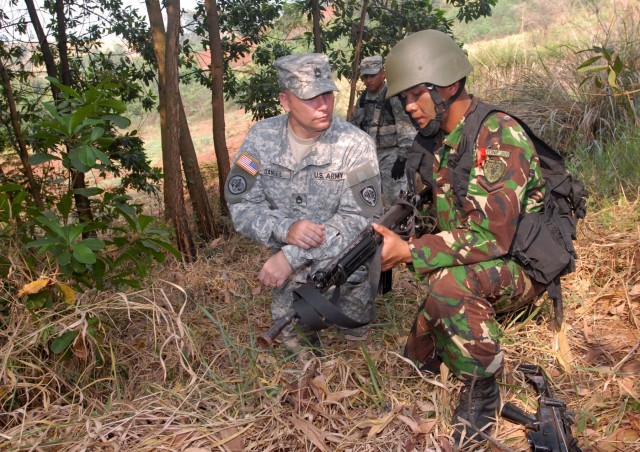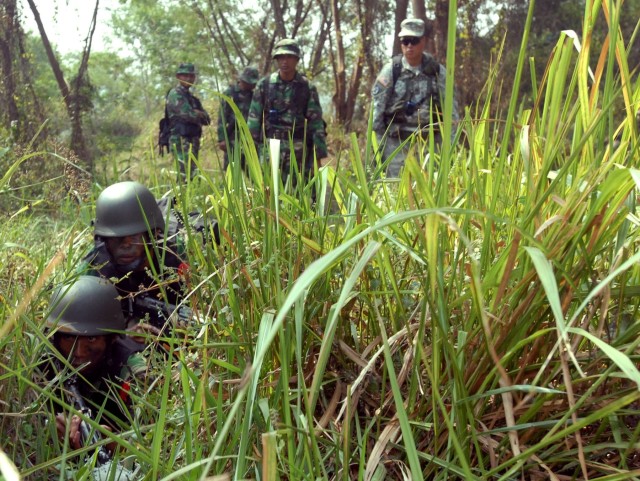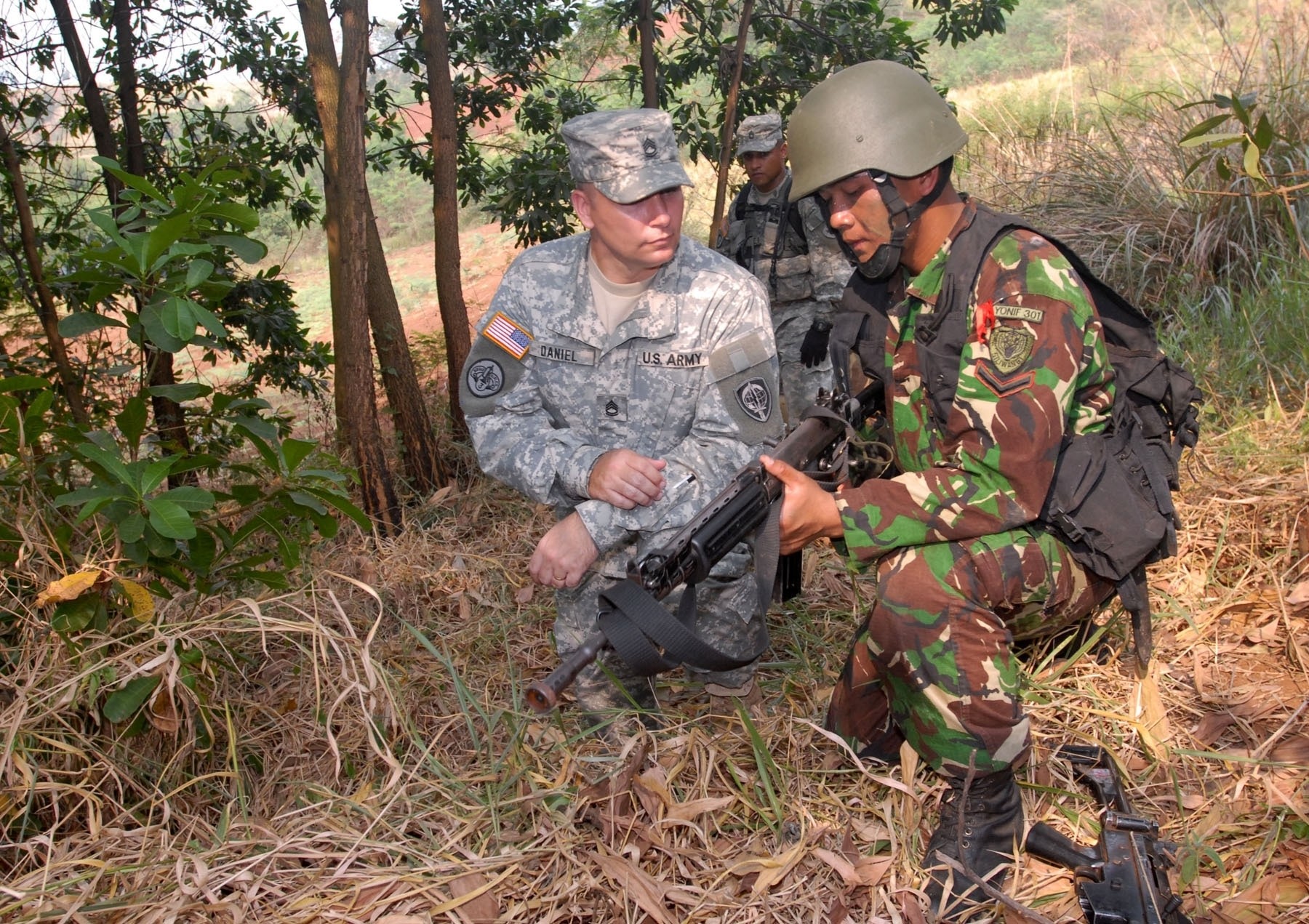BANDUNG, Indonesia -Imagine the state of the U.S. Army if a non-commissioned officer had the same duties and responsibilities as that of a private. How would it run'
How would the Army learn to grow their junior Soldiers into non-commissioned officers'
Three U.S. Army Pacific NCOs traveled to Indonesia to train junior NCOs by conducting the first U.S. Army Warrior Leader Course with the Indonesian Army.
"We are introducing this squad leader level leadership course to assist the Indonesian Army to develop confident and competent NCOs and they can extract the relevant information that we're training and mold it into a course that they can teach their NCOs in the future," said Sgt. Gerald Daniel, the program's Operations NCO at the Office of Defense Cooperation, Jakarta.
Daniel joined the United States Army, Pacific team from Hawaii of Sgt. 1st Class Sehuan Flax, Staff Sgt. William Vargas, and Staff Sgt. J.J. Williams in Bandung to accomplish this mission.
The team conducted two fifteen-day courses from June through August. The second course enrolled outstanding graduates of the first class in an Instructor Training Course. In true train-the-trainer fashion, the top students became instructors. Of the 42 WLC graduates, 20 were selected for the ITC.
"They are going about it the right way by giving them attributes to become efficient leaders so they can establish that confidence in the NCO Corps," said Sgt. Maj. William Smith, USARPAC operations sergeant major, who compared the WLC course to planting a seed that must be tended to. "By tending to this seed, they have the opportunity to help that seed to grow into a more capable military."
Overall, the obstacle encountered by all instructors aside from a language barrier was getting the students to rethink their role as decision-makers.
"At their level, in their Army, they're just given an order. They don't actually get a chance or the opportunity to plan or make the decisions, it's the officer that makes every decision," Vargas said. "Normally, they wait for somebody to tell them what to do, so what we try to teach them is that they're the one in charge, they make the decisions."
During the course, emphasis was placed on leadership and responsibility. Students were taught the NCO Creed, Warrior Ethos, leadership and attitudes towards conducting tasks as leaders.
"Each day, we tackled a part of the Creed and then made sure it was understood, the meaning, and then go into ways to apply the meaning," said Flax.
The three found ways to take their knowledge as instructors and NCOs and translated it with results. One example of a shift in response from students was the After Action Review, an open forum and standard throughout the Army for evaluating performance in an informal setting, also known as the AAR, but previously unknown to the Indonesian Soldiers.
"The first couple of AARs, no questions were asked, it was pretty quiet, not a lot of interaction, it was like pulling teeth to get them to comment. But now, they talk to one another," said Flax.
"We're showing them that they can be given a mission, even something simple like a wall locker inspection, and execute," said Flax.
None of this training could have taken place without USARPAC's Theater Support Cooperation Program. Usually this partnership between USARPAC and 39 nations across the Pacific is observed during annual exercises. Bringing the WLC to the Indonesia Army could possibly do more for this Pacific partner than any exercise ever could.
Command Sgt. Maj. Joseph P. Zettlemoyer, USARPAC Command Sergeant Major, said that the Indonesian Army is learning the right way for the future of the NCO Corps.
"I am elated that Indonesia has taken the first steps towards professionalizing their NCO Corps," he said. "This enhances their capabilities while strengthening their units at the platoon and company level, and will eventually be a combat multiplier at the highest levels within their Army."
According to Zettlemoyer, future hopes include actual NCO academies, as well as further training.
"I would like to see NCO Academies within their Training Command that provide the necessary background in Leadership Fundamentals, Warrior Tasks and Battle Drills to their Soldiers and NCOs at different levels much like our WLC, Basic NCO Course, and Advanced NCO Course," he said.
Both students and instructors expressed a feeling of accomplishment from the course. "The WLC makes me proud to be an NCO because I understand the NCO has an important function for the Army, like a backbone," said Sgt. Asep Anda, a squad leader from 301st Battalion, TNI (Tentala Nasional Indonesia) Infanteri.
Students were congratulated and encouraged to take pride in their NCO Corps by the U.S. Soldiers.
"I am very proud of what you have accomplished in the short time you have been here with the challenges you had to overcome," said Smith to the Soldiers after inspecting their barracks. "You are making history in your own country, and I ask that you all go out there and do your job to the best of your ability, hold your head high and never forget that it is important to be a leader."
The future of the Indonesian NCO Corps is still undetermined. While the first "seeds" have been planted, how much of the training is brought back to their units and used daily will ultimately determine their future success.
"I hope that everything they learn in here, they can go back to their units and try to use it," Vargas said. "It doesn't matter if they take 70 percent or they take 100 percent, at least if they got something from us, and they get a chance to go and apply it, that's something that will make me happy."




Social Sharing